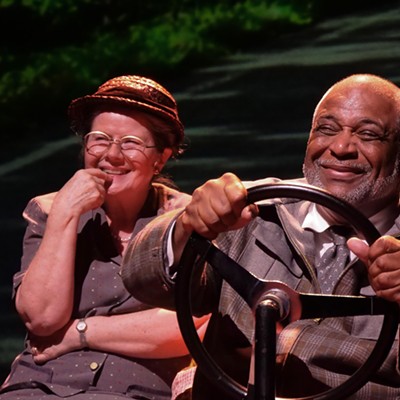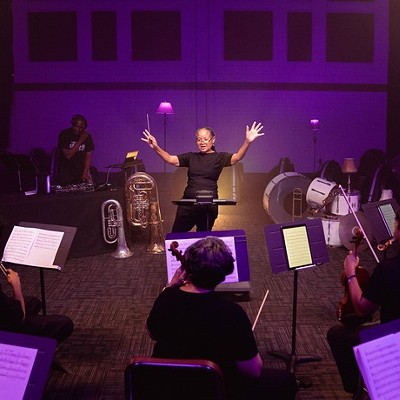The setup:
Okay! Ready? Go! Gimme an M...gimme a U...gimme an S...gimme an I...Oh forget it, this is taking too long. If you haven't figured it out by now, I'm trying to introduce a musical about cheerleaders. Three of them, to be precise. Well, they were cheerleaders back in the day, at any rate.
Vanities, the Musical, adapted by Jack Heifner (from his 1976 Off-Broadway play) with music and lyrics by David Kirshenbaum, follows the lives of three best-friend Texas cheerleaders as they go off to college, get married, get liberated, get disappointed, get reflective and get whatever it is that will make them archetypes worth singing about.
Spanning three decades from the social revolutionary '60s to the '80s Me Generation, Vanities is one of those what-happens-after type shows. Specifically what happens to these women once the spotlight of high school popularity dims and real life multiplied by time and circumstance high-kicks into their lives? Hoping this is a show with deep, meaningful female insight or a conclusion not wrapped up in a pretty bow? Let me grab my pom-poms and cheer it out for you. You'd Be Mistaken!....B...E...Mistaken!
The execution:
You'd also be mistaken to think this show isn't a lot of fun in its own fluffy kind of way. Or at least the first half is. It's 1963 when we meet the girls as they plan their first pep rally and school dance. There's über-organized squad leader Kathy (played with controlled warmth by Danica Johnson), Mary the budding rebel (a confidently recalcitrant Mary Johnson) and doltish, prudish Joanne (the superlative scene-stealing Shelby Bray).
Life is good for the girls. They're cheerleaders, they're popular and they know it. And what they want out of life is alarmingly simple. Singing about their American Dream, the girls long for "A perfect husband and perfect diamond ring...making a casserole, a Jell-O mold, cook but never clean."
If that weren't enough to make any feminists in the audience cringe, just wait until the three start to think ahead to college. Each girl wishes to attend, but it's the promise of sorority life and snagging a husband that excites them most. As Joanne says in deep Texan drawl, "I want to go to college but I sure don't care to learn anything." It's a terrifically politically incorrect line delivered with a heaping dose of irony, sass and dimwittedness by Bray. We laugh at Joanne and the other girls' shortsightedness thanks to Jimmy Phillips's whimsical direction, which allows his cast to play ridiculous without being ridiculous. Yes, these young women say and do things that make us shake our heads, but Phillips allows them sweetness or at least a layer of vulnerability that we can't help finding amused affection for.
Some of this happens even before the formal action takes place onstage. Phillips has the performers enter the space prior to each era and costume change, placing them dimly lit at their vanity tables, hair netted, clad in nothing but black undergarments. We watch as they fix their make-up, dress in the time-appropriate clothing and don the wig that represents their character's style at the moment. Kudos here to costume designer Pat Padilla for nailing the looks with playfully iconic fashion sense.
Watching these women go from bouffant hairstyles to the Sassoon look of the '80s and shed their cheerleader uniforms for more grown-up duds is a distinctly nonsexual, voyeuristic, smart-with-a-capital-S view of the trio. Not only does the ritual fascinate as we watch the women transform, it makes the fairly one-dimensional stereotypes they play seem far more human and exposed than they deserve to be.
Musically we sit back and enjoy the mostly peppy and eminently hummable, if not always lyrically stirring, numbers thanks to Phillips's economic but visually playful choreography. Working with a small propless stage save for three vanity mirrors and only a few white block risers, Phillips smartly doesn't attempt to stage large complex dance routines. Instead, the women rely on a few nicely synched moves (the cheerleading scenes as well as some group numbers) and more personally contained emotive movements for their solo efforts.
Nowhere does this pay off more than at the end of Act 2, when the girls are together at college in Dallas arguing over what musical score to choose for the sorority sing-song competition. After a very funny discussion that rules out Fiddler on the Roof (the Jewish sorority always does that), Oklahoma (SO not where it's at), Bye Bye Birdie (too controversial because of the whole murder thing) and Cabaret (too German), Mary suggests a new musical, Hair, as an option, knowing the girls haven't a clue what it's about.
It sets Mary up for her big number, "Fly into the Future," the knockout song and performance in the show. She sings it completely from a kneeling position on her bed but with incredibly nuanced movement and physical expression, laying out her desire to break from the complacent and domestic desires of her friends and to run away from her dysfunctional family. It's the start of the trio fracturing into different women with different paths, and Van Zandt pours all she's got into the number, and trust me, this is a woman with a whole lot when it comes to vocal talent. The result is nothing short of goose-bump-inducing.
Unfortunately, it also signals a tone change for the second half of the play. Post-Intermission is time to get "serious" and no matter how talented the performers or how breezy Phillips's direction may be, it can't stop the show from biliously tumbling from comedy to melodrama. After going separate ways for several years, the women reunite in Kathy's swishy Manhattan apartment only to learn that they've nothing in common anymore. Without spoiling exactly which stereotype each one has become, suffice it to say that it's what you expect, more or less. Sham marriage, nervous breakdown, throwing yourself into work to compensate for lack of love, it's all crammed in. Sturm und Drang abounds for all of the women, and frankly it's depressing in its narrative familiarity.
The only bright spot is the second half's opening song, "The Same Old Number," in which Joanne drunkenly sings that no matter how much time has passed, things remain the same for the friends, which of course is not true in the slightest. All show long, Bray wows us with her splendid voice and impeccable comedic timing. Here she expands our admiration even further by not only playing dumb with hysterical finesse but playing it tipsy and jovial only to end up angry and aggressive. It's a lesson in performance range that almost excuses the hackneyed circumstances of the plot that get her there and then moves the ladies on to the conclusion.
I'll give you the CliffsNotes version for the rest of the plot, as that's really all it deserves. The girls fight, they make up, rah rah rah, all is good in adult cheerleader land. Yawn.
The verdict:
2...4...6...8...who do we appreciate? This is a production riding on wonderful performances. Johnson, Van Zandt and Bray are individually and collectively far more compelling than the musical itself. Sure, the tunes are snappy enough, occasionally there's a line or two that impresses and the live band (with too many instruments to mention) offers much-needed energy to the endeavour. But the silly fun we enjoy at first is so muddled down by the heavy-handedness and kumbaya happy ending of the second half that the whole thing becomes a bit of a bore.
It's not often as a critic I endorse lighthearted confection over heady narrative. But in the case of Vanities, the Musical, the beauty here should have remained skin deep.
Vanities, the Musical continues through May 3 at Obsidian Art Space 3522 White Oak. Purchase tickets online at thelabhou.org or by phone at 713-868-7516. $30-$35.






